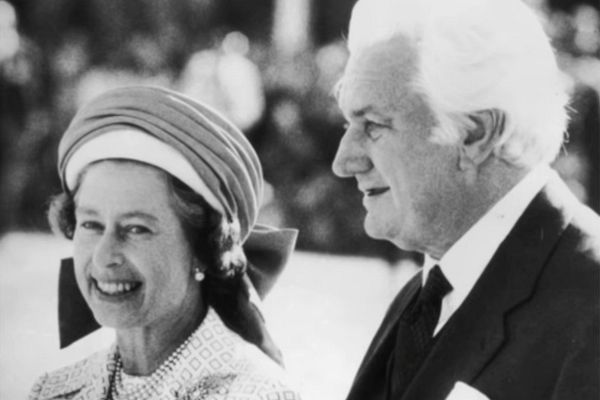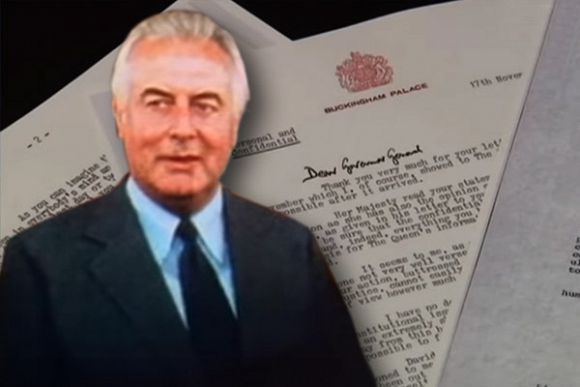Six months ago, the historic release of the Palace letters set off a campaign. Not to renovate Australia’s head of state for the 21st Century, but to perpetuate an Australian monarchy.
In July 2020, long-time National Archives chief David Fricker wowed us with his public performance of the Palace letters. He’d spent millions guarding those letters and artfully tweaked the legal goalposts more than once. Suddenly, he was Mr Pro Disclosure.
The High Court had finally liberated the letters from their indefinite Queenly detention. At age 94, she found it politic to trundle out a fresh denial for loyal subjects. Neither she nor the “Royal Household” had any part in Gough Whitlam’s 1975 Dismissal.
Her Australian defenders were quick to amp it up. Chief royalist Prime Minister Scott Morrison can still dream of presenting “Jenny and the girls” to King Charles down under. A different Jenny, Professor Hocking, had forced the release of the letters. Ultimately, she will win this history war, just as Lyndall Ryan is winning the frontier history war.
Don’t get me wrong, the number one culprit is always John Kerr, Whitlam’s extraordinarily unwise choice for Governor-General. No other “Queen’s representative” would have stalked an Australian government with such intensity unto his own downfall.
But the letters reconfirm Kerr as the Queen’s man, not Australia’s. You can’t totally nail him and other Australian conservatives like Malcolm Fraser or Justice Anthony Mason. The Palace, too, was at fault, though the Queen has little choice but to keep bluffing.
It turns out Kerr didn’t alert her on the precise day of the Dismissal. Mainstream media was reluctant to probe her fresh denial. It was quickly dubbed ‘ridiculous’. ‘Implausible’, agreed John Menadue, who was chief of the Prime Minister’s Department on Dismissal day.
Menadue inquired, why did the Queen personally bury the letters in the first place? Also, she had a close relationship with blue blood Private Secretary Martin Charteris. He didn’t act independently.
Notably, the Palace had directed Kerr to the dud constitutional wisdoms of Canadian Eugene Forsey. Which unreasonably favoured dismissal. Afterwards, Charteris contacted Kerr, wrongly insisting Kerr had had “no other course”.
It was our future King, who blithely conveyed Kerr’s scheme back to the Palace. Not so Kerr could be gently distracted, but so the Palace could cultivate him. Afterwards, Charles personally thanked Kerr for his “right and courageous” decision.
Which leads to this thought experiment: under Palace “neutrality”, would the Government have been dismissed with the incumbent Whitlam a Liberal, the insurgent Fraser for Labor? Hardly likely.
Responding to the letters, Labor leader Anthony Albanese sought an Australian as head of state. Six months on, nobody much is pressing Morrison to respond. This leaves other agents free to pursue proven propaganda techniques. Keep framing the Queen’s denial as factual, push the message out there and many will believe you.
Crucially, Fricker’s show spun Morrison’s way. As did his selective briefing to the Murdoch media ahead of litigant Hocking.
Constitutional scholar Anne Twomey presumed to find ready historical precedents for the egregious Charteris-Kerr exchanges. There was no Palace conspiracy, she hurrahed, demolishing her own straw man. Palace mistakes, I’d say.
The appeasement in ‘The Truth of the Palace Letters’ comes from Murdoch scribes Paul Kelly and Troy Bramston with a bonus — an introduction from Paul Keating.
This book was launched by Labor frontbencher Tanya Plibersek at the Museum of Australian Democracy, which is in Morrison’s portfolio. Copying Keating, she claimed the Queen had ‘no genuine role’ in the dismissal. Absurdly, she lionised the Windsors as ‘above politics’.
For Michael Sexton in Murdoch’s The Australian, Kelly-Bramston ‘certainly’ absolved the Queen of ‘any role’.
Hocking’s own book, ‘The Palace Letters’, was launched by webinar from the Whitlam Institute. Introducing it and rejecting our colonial governance schema is Malcolm Turnbull.
‘As early as September 1975,’ Hocking concludes, the Queen knew Kerr was thinking of dismissal. She knew – and accepted – that Whitlam wasn’t in the loop. In Kelly-Bramston, however, the Queen shrinks to a ‘passive but interested observer’ who’s ‘hostage’ to Kerr.
Take your pick. The Palace was disingenuous or ineffectual.
As per Mike Steketee, Kelly and Hocking both know their stuff. Both agree, Kerr was dead wrong. Why bicker over faded Palace fingerprints, when in Morrison’s cloying cliché, the Australian monarchy “ain’t broke” yet.
Formally, his Queen is only a ‘symbolic and ceremonial’ gig. Her Governor-General, too, exercises “ceremonial” functions. Except for “reserve” powers used to sack Whitlam.
But retro royalists aren’t sandbagging just for ceremonies. In their minds, the Windsors dispense continuity and stability. In this mystical narrative, monarchies protect freedom, preserve civil liberties, curb nationalist excess.
Yet the royal side of the letters evidences dilettantism and scratchy judgment. Problem was, Fraser and Kerr had railroaded the Palace into a real-world political problem.
Self-assured Charteris, in my view, could have nudged his loyal courtier off track. In which case, Kerr would most likely have retreated. Or, he could cultivate Kerr. In which case, his loose cannon would most likely do something silly.
The Palace took the second route. Bemiring itself. Destroying Kerr and damaging Fraser. Aggravating the third-ranked Commonwealth realm for 45 years and counting. Some stability.
In theory, today’s stately minuet between Private Secretary Edward Young (KCVO PC) and Governor-General David Hurley (AC, DSC, FTSE) continues to bolster democracy.
I wonder about that. Their Palace and our Government House always live with their Australian own-goal. They’d be unlikely to seek out controversy. And yet, their colonial franchise could still be pitted against contemporary problems. In which case, I contend, they would still lean towards monarchical or conservative preferences.
Even after Hocking first approached the Federal Court in 2016, Palace and House traded fresh letters. Bluffing for the Queen’s “privacy”. Batting for England, not Australia.
Also thanks to Hocking, we now know the outcome, when (inevitably) Kerr agitated against Fraser himself. Swiftly, emphatically, Charteris shut him down. Some neutrality.
Surveying the sorry saga, I baulk at any grand Australian “republic”. I’m hoping the seedy Morrison-Trump bromance kills off any idea of a directly-elected “president”.
A modestly named “federation” or “commonwealth” looks more saleable. Fondly bid farewell to the Queen, while preserving a type of federal “governor”. Our six State Governors would no longer report to her either.
Right now, the Queen is ‘little more’ than titular, blurbs Federal Parliament. Head-of-state powers are “vested” in the Governor-General. Royalists themselves fake it, that the Governor-General is already our head of state. Great — let’s make that official.
At least the gig would be Australian. At least we’d own its successes and failures.
Australia can be quick and bold when it suits. Joining a fight with the U.S., picking a fight with China. But archaic, demeaning, supervision orders from ye olde England?
We can’t even go near them till the Queen is gone. Even then, royalists will want to give King Charles an Australian canter. Waited so long, so loves Australia, and so on.
With his anthem amendment a sop to Indigenous interests, Morrison will keep bragging of the world’s “most successful multicultural” nation, yet also embrace our go-to head of state being the white hereditary Supreme Governor of the Church of England.
That’s not right. But nothing will change, unless we get another small-l liberal in charge of the Liberals and cooperating with a resolute Labor team. Could be a while.
Stephen Saunders is a former public servant, consultant and Canberra Times reviewer.
Related Articles
- The Queen and the Governor-General
- Jenny Hocking's heroic palace coup is a victory for truth
- Palace letters add to the history of the Whitlam Dismissal
- High Court ruling on the Palace letters could bear explosive consequences
 This work is licensed under a Creative Commons Attribution-NonCommercial-NoDerivs 3.0 Australia License
This work is licensed under a Creative Commons Attribution-NonCommercial-NoDerivs 3.0 Australia License
Support independent journalism Subscribe to IA.
















